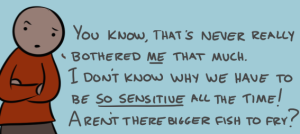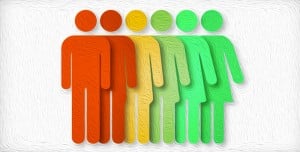Originally published on Mic and republished here with their permission.
“We’re gathered to celebrate Women’s History Month, but I don’t celebrate Women’s History Month,” announced writer Mona Charen, one of the panelists at the Heritage Foundation’s recent panel on feminism and happiness.
“It doesn’t interest me whether a person who happens to share my chromosomes sits in the Oval Office. It doesn’t interest me how many women members of the Senate there are.”
No, Charen continued, one of the things that interests her the most about Women’s History Month is how “feminism has done so much damage to happiness.”
It was a bold statement, and one that set the tone for the conservative foundation’s panel discussion among a group of conservative writers and academics addressing an audience of mostly male interns.
During the meeting, the attendees waxed poetic about the failures of the “project” known as feminism, spending hours decrying the perceived failures of the women’s movement in America.
But that’s simply not true.
It may seem like a bizarrely obvious statement, but somewhere between earning women the right to vote, pushing through legislation opening up universities to female students and advancing the civil rights movement (to name just a very few examples), feminism has indeed made life much, much better (and as a result, happier) – not just for American women, but American men as well.
Far removed from the stereotypical and inaccurate image of the bra-burning activist, feminists have proven time and time again that women’s rights are human rights. And as the Declaration of Independence so elegantly points out, the ideals of life and liberty are intrinsically tied up with that third pursuit: happiness.
Yes, feminism has changed the world. And yes, it has made people happier. To argue otherwise, as the Heritage Foundation panelists attempted to do in Washington, is to show blatant disregard (or willful ignorance) for the historical record.
It is also an argument that insults the legacies of centuries of badass feminists who have bravely fought, failed, and ultimately prevailed in the ongoing struggle to empower the marginalized and elevate the disenfranchised.
A comprehensive list of these achievements would be far too long, but here we’ve compiled a pocket edition, just in case you ever run across someone who honestly believes feminism has made the world an unhappier place.
1. They Quietly Propelled the Civil Rights Movement
Everyone knows about Dr. Martin Luther King, Jr. and Rosa Parks, but most Americans don’t know about the other women involved in organizing the Montgomery Bus Boycott.
In her book At the Dark End of the Street, Danielle McGuire recounts the many women who copied and distributed fliers, effectively leading the boycott, not only to protest segregation but to fight back against sexual assault.
That fight – against the ritualistic rape of black women by white men in the South – had begun generations before Parks, who is rarely granted credit for the breadth and depth of the feminist work she did.
2. They Made Americans Get Serious About Gender Discrimination
The Equal Rights Amendment, first written by Alice Paul in 1923, read, “Equality of rights under the law shall not be denied or abridged by the United States or by any state on account of sex.”
Proposed as a constitutional amendment that would guarantee all women have equal rights under the US Constitution, the ERA failed to be ratified in dramatic fashion in the late 1970s.
However, the fight to get the ERA passed signaled a monumental shift in American society and sparked a new debate about the role of women and how they should be treated, pushing many states to draft their own gender discrimination laws.
3. They Brought Women Out of the Household – If They So Chose
Anti-feminist activist Phyllis Schlafly recently argued that women don’t need equal pay: “Another fact is the influence of hypergamy, which means that women typically choose a mate (husband or boyfriend) who earns more than she does. Men don’t have the same preference for a higher-earning mate. … Suppose the pay gap between men and women were magically eliminated. If that happened, simple arithmetic suggests that half of women would be unable to find what they regard as a suitable mate.”
Thank goodness she’s just a relic.
In reality, the women’s movement has brought women out of the household and into the workplace. Women of color who were already working were joined by housewives in the labor force, which fundamentally changed the economy.
Changes catalyzed by feminism have closed the wage gap between men and women from 62 to 77 cents on the dollar, though there’s still a long way to go.
But feminism should be credited for changing the conversation around what types of work women can do and what they demand to be paid for it.
4. They Called Out Rape Culture
“Date rape” isn’t something that feminists made up.
And contrary to some terribly inaccurate statements made by conservatives, it was feminism that helped begin to remove some of the stigma surrounding sexual assault, giving survivors the language to label their sexual trauma.
The fact is, 1 in 5 women will experience an attempted or completed rape in her lifetime. This is a problem of epidemic proportions, and we should all be talking about it, not sweeping it under the rug and blaming feminists for being hysterical.
Increasingly, young feminists are starting to taking active roles in the fight against violence, as well.
The recent wave of activism on college campuses to end rape, as well as the Slutwalk movement, highlight some of the ways young women are working to protect their own bodies, while creating safe spaces to learn and thrive.
5. They Used Online Feminism to Give the Marginalized a Voice
Online feminism is responsible for some of the movement’s most high-profile recent victories.
The backlash against the Komen foundation for pulling Planned Parenthood funding for political reasons, forcing the takedown of anti-choice billboards in downtown Manhattan, as well as the response to Rush Limbaugh’s sexist attacks onSandra Fluke, feminism is alive and well.
Feminist blogs are among the most popular on the web, and stories about women and the issues that impact their lives are creating the space for important conversations about inequality.
Further, online spaces have allowed for people living on the margins to find a proper audience, whether domestically or abroad, and this has opened discourse on intersectionality and transnational feminism.
6. They Pushed Pop Culture Icons to Join the Fight
When Beyoncé explicitly labeled herself a feminist on her latest album, feminists everywhere rejoiced at the opportunity to introduce young women to the fight against sexism.
That mainstream entry point, even more crucial for marginalized women, has been opened by popular artists in the past, however, including Madonna, Cindy Lauper, MC Lyte, TLC, and Queen Latifah.
These proud ladies have inspired young people to be fiercely independent and opposed to injustice – and not to be afraid of the feminist label.
In other corners of the entertainment industry, role models like Lupita Nyong’o, Ashley Judd, Laverne Cox, Kerry Washington, and Janet Mock have all taken up the call for equality, representing a cultural shift in how we perceive women, women of color, and the feminist identity.
7. They Helped Pass Title IX, Opening New Educational Possibilities
Although Title IX is commonly associated with compelling colleges and universities to support women’s athletics, one of the biggest and most immediate impacts of the law affected women enrolling in law and medical schools.
Indeed, Title IX opened up huge opportunities for women, ensuring them equal access to higher education.
Today, women make up 58% of college undergraduates – an undeniable improvement in the lives of women everywhere.
8. They Took On Campus Sexual Assault
Title IX also protects women from gender discrimination on college campuses. Under Title IX and the Clery Act, students are guaranteed the right to an education without sexual harassment and violence.
Feminist activists have been working tirelessly all over the country to file complaints against their universities for inadequate handling of sexual assault cases, in order to make campuses safe for everyone.
9. They Put a Human Face to Sexual Harassment
In 1991, a young law professor named Anita Hill took the nation by storm. Hill’s bravery in the face of a sexist interrogation by the Senate Judiciary Committee forced the country to finally take sexual harassment seriously.
During the confirmation hearings of now Justice Clarence Thomas, Hill, Thomas’ former assistant, testified that he habitually sexually harassed her. At the time, instead of questioning Thomas’ actions, the media and the Senate interrogated the unflinching Hill.
Journalist David Brock attempted to paint Hill as “a little bit nutty and a little bit slutty,” and numerous conservatives accused the poised law professor as a woman scorned motivated by political ideology.
As a result of Hill’s act, women around the country realized they did not have to suffer harassment in silence.
“I think people are well aware that they have a right to come forward,” Hill said recently, looking back on the hearings. “But many people have a fear that the processes will not give them a fair hearing. Even for those who complain, I think we’ve fallen down in terms of the investigative process.
“We still have a lot of challenges in terms of making sure that the people who are found guilty of harassment suffer the consequences of their behavior.”
10. They Fought Legal Discrimination in the Nation’s Highest Courts
Before she was a Supreme Court justice, Ruth Bader Ginsburg was a feminist in her own right, arguing gender discrimination cases before the Supreme Court as a young lawyer with the ACLU.
The unequal treatment that Ginsburg received as a student at Harvard Law School shaped her staunch feminist principles and inspired her work to fight for equality.
In Ginsburg’s words, “Women’s rights are an essential part of the overall human rights agenda, trained on the equal dignity and ability to live in freedom all people should enjoy.”
11. They Stormed the Beltway’s Boys Club
In 1992, the 93rd Congress was deemed the “year of the woman” as more women were elected. The number of women in public office has only grown over the years, and the Senate currently boasts 20 women, the highest total in American history.
As the number of females in Congress rises, so does the profile of women’s issues. House Democratic Leader Nancy Pelosi (D-Calif.), arguably one of the most successful speakers in history, has helped pass several pieces of feminist legislation, including the Violence Against Women Act, which was originally passed in 1994 but wasreauthorized in 2013.
The saying goes “the personal is political,” and the Center for Women in Politics found in multiple studies that interview men and women elected officials and found that women are much more likely to propose a women’s rights bill or a piece of legislation that improves the lives of women and families.
More women in office is good, but more women with feminist ideals is even better and the legislation is proof.
12. They Broke Barriers for Little Girls with Presidential Aspirations
Before there was Hillary, there was Shirley.
Shirley Chisholm, a fiery congresswoman from New York, was the first black woman to run for president in 1972. When she announced her historic candidacy, Chisolm cut right to the point.
“I am not the candidate of black America, although I am black and proud,” she said. “I am not the candidate of the women’s movement of this country, although I am a woman and I am equally proud of that. I am the candidate of the people, and my presence before you now symbolizes a new era in American political history.”
13. They Joined in the Struggle for Marriage Equality
To outsiders, marriage equality is not always viewed as a feminist issue. But for years, feminists have worked tirelessly to help roll back discriminatory laws and strike down marriage bans in state after state.
The question is no longer “if” same-gender couples will have equal rights and the ability to marry the person they love, but when.
14. They Demonstrated Why Revolutions Must Include the Female Perspective
Global feminism deserves its own list, as there are countless number of examples of women leading in protest movements for equal rights across the globe.
Most recently, numerous women-led organizations, including El Karama, mobilized around the work of many women activists who participated in the so-called “Arab Spring” restructurings.
Women’s rights activists throughout the Middle East fight for equal rights and demand an end to violence against women. This robust landscape has lead to real improvements, including several proactive anti-harassment campaigns that have sprung up in Egypt.
15. They Realized a Balanced Court Is a Happier Court
For the first time in American history, three women are simultaneously sitting on the nation’s highest bench.
The seasoned Justice Ginsburg was joined by fellow liberal justices Sonia Sotomayor and Elena Kagan during the first term of the Obama presidency – and they hit the ground running.
More recently, during the oral arguments in Sebelius v. Hobby Lobby Stores, Inc., the case that seeks to challenge to the Affordable Care Act’s contraception mandate, these justices showed their feminist cred. Justice Kagan noted that women are “quite tangibly harmed” when they are unable to afford contraception.
16. They Forced Americans to Recognize the Importance of Birth Control
Women were instrumental in electing President Barack Obama, and feminists therefore were at the forefront to hold the administration accountable after the election.
One of their biggest pushes was ensuring that a contraception coverage was a part of the benefits of the Affordable Care Act. When Republicans and bluedog Democrats were putting the mandate in danger, it was the feminist conscience of the Obama administration, Valerie Jarrett, who spoke up and helped ensure it was included in the final bill.
17. They Focused Attention on Domestic Workers’ Rights
Feminist labor leaders are changing the face of the labor movement and refocusing their efforts on the rights of domestic workers, mainly nannies, home care workers and housekeepers, many of whom earn less than the minimum wage.
In 2010, New York passed a Domestic Workers Bill of Rights that gave domestic workers the right to overtime pay and paid sick days.
18. They Helped Create the White House’s Council on Women and Girls
Chaired by Jarrett, the White House Council on Women and Girls was created just a few months after Obama was sworn in.
At the signing of the executive order, Obama said the council’s purpose is “to ensure that each of the [federal] agencies in which they’re charged takes into account the needs of women and girls in the policies they draft, the programs they create, the legislation they support.”
The true purpose of our government, Obama continued, is “to ensure that in America, all things are still possible for all people.”
19. They Worked to Eradicate Back-Alley Abortions
The landmark case Roe v. Wade and subsequent cases upholding women’s constitutional right to privacy and choice to terminate a pregnancy if necessary has been under assault since it became a crowning feminist achievement in 1973.
20. They Made the Workplace a Little More Equal – For Everyone
The first piece of legislation Obama signed into law was the Lily Ledbetter Fair Pay Act, which gave women more time to sue an employer that paid them unfairly.
Without pressure from feminist thinkers and women in public office who refuse to accept the status quo – where women make less for the same work as a man – the pay gap would likely be bigger than it is today.
As it stands now, women on average make only 77 cents for every dollar a man makes, and that number gets worse for black and Latina women.
It’s telling how far we have to go that this legislation was considered controversial when it was just making a common-sense adjustment to an existing law.
21. They Proved That the Next Big Thing in Science Could Be Discovered By a Woman
Are you a young women in the sciences? Feminism had something to do with that.
The movement created the space for women to take the leap into fields historically filled with men.
First Lady Michelle Obama has been a fierce advocate for the importance of steering girls toward careers in science, technology, engineering, and math (STEM).
“If we’re going to out-innovate and out-educate the rest of the world, we’ve got to open doors for everyone,” she said. “We need all hands on deck, and that means clearing hurdles for women and girls as they navigate careers in science, technology, engineering, and math.”
Women in STEM jobs earn 33% more than those in non-STEM occupations and experience a smaller wage gap relative to men. While women remain at a plateau of under representation in STEM careers, more women are graduating with related degrees, hopefully for telling a more promising future.
22. They Earned Women the Right to Vote
Perhaps the greatest feminist achievement was helping women win the right to vote, as well as the right for female political candidates.
The suffrage movement of the early 20th century culminated in 1920 with the passage of the 20th Amendment.
Its now famous words “The right of citizens of the United States to vote shall not be denied or abridged by the United States or by any State on account of sex” have shaped the course of history.
23. They Argued That ‘Women’s Rights Are Human Rights’
Who can make a list about feminism in 2014 without mentioning Hillary Clinton?
The former Secretary of State, primed to run for president again in 2016, will always be known as a hero for women and girls because of her speech to the United Nations in 1995.
“I believe that, on the eve of a new millennium, it is time to break our silence,” she said. “It is time for us to say here in Beijing, and the world to hear, that it is no longer acceptable to discuss women’s rights as separate from human rights.
“If there is one message that echoes forth from this conference, it is that human rights are women’s rights. And women’s rights are human rights.”
[do_widget id=”text-101″]
Zerlina Maxwell is a political analyst, speaker, and contributing writer for ESSENCE Magazine. She writes about national politics, candidates, and specific policy and culture issues including feminism, domestic violence, sexual assault, victim blaming and gender inequality. Check her out on Twitter @ZerlinaMaxwell and on her website.
Search our 3000+ articles!
Read our articles about:
Our online racial justice training
Used by hundreds of universities, non-profits, and businesses.
Click to learn more





















